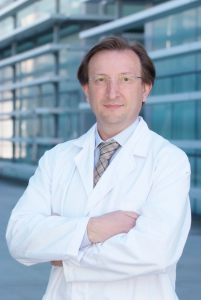Check out the interview with the Spanish specialist in reproductive medicine, obstetrician and gynecologist
 The School of Medicine will be opening its doors to Spanish medical doctor Carlos Simón Vallés for a lecture on stem cells for reproductive medicine, on May 25. Dr. Vallés is a Full Professor of Obstetrics and Gynecology at the University of Valencia (Spain), Adjunct Professor at the University of Stanford and at the Baylor College of Medicine (USA) and the Scientific Director of biotechnology company Igenomix. He was the first to work with stem cells in Spain and designed several cell lines, which gave birth to a free access database, run by the University of Valencia.
The School of Medicine will be opening its doors to Spanish medical doctor Carlos Simón Vallés for a lecture on stem cells for reproductive medicine, on May 25. Dr. Vallés is a Full Professor of Obstetrics and Gynecology at the University of Valencia (Spain), Adjunct Professor at the University of Stanford and at the Baylor College of Medicine (USA) and the Scientific Director of biotechnology company Igenomix. He was the first to work with stem cells in Spain and designed several cell lines, which gave birth to a free access database, run by the University of Valencia.
The lecture, delivered in partnership with Fertilitat – Center of Reproductive Medicine, will be open to the public and is geared to students, medical doctors, researchers and health care scientists. The event starts at 11 AM, at the Irmão José Otão Amphitheater, on the 2nd floor of São Lucas Hospital (Av. Ipiranga, 6.690). No early registration is required. However, School of Medicine students who wish to receive a certificate of attendance must send an email to [email protected], and enter their full name.
Among the several awards he has won, lies the Distinguished Researcher Award, the highest recognition to be bestowed by the American Society of Reproductive Medicine (ASRM), in 2016. Additionally, Dr. Vallés, has written 408 scientific articles. In his view, the main progresses in the area of reproductive medicine have perfected the efficiency and safety of the reproductive process and in genetic tests for couples and embryos, thus ensuring the production of healthy babies, with no chromosomal or genetic disorders.
On the challenges for reproductive medicine, Dr. Valléz will go on to highlight its applicability not only for infertility patients, but also for everyone who wish to constitute a family, with children with no congenital diseases. “I don’t see ethical dilemmas in this kind of treatment. Couples want to constitute their own family and if they have any medical conditions, we’ll help them through that”, says Simón.
– Many women have decided to have kids after the age of 40. What are the chances for such women in terms of the advances of reproductive medicine?
The possibilities for women in their forties relies basically on the existence of good ovarian reserve to obtain eggs, after this first barrier the analysis of chromosomal abnormalities using preimplantation genetic screening is mandatory to assure a healthy baby at home.
– What is the role of stem cells in fertility treatments?
Stem cells are being used to treat with cells what cannot be treated with drugs for example in the Asherman syndrome which results from curettages and repetitive scratchings Autologous cells, deriving from the bone marrow, are being used to create gametes when these cannot be produced from the reprogramming of skin cells.
– Are there any counterindications?
The only contraindications apply for patients that cannot conceive due to medical conditions that would put their life to risk if they become pregnant.
– How relevant is this topic for the training of new medical doctors at universities?
Reproductive medicine is an area that is becoming increasingly popular and is being addressed in Universities worldwide. It is crucial that the medical training of students address areas that go beyond the scope of clinical sciences.
– How do you see Brazil in the international scenario?
Brazil is doing pretty well in terms of science development. Scientists are excellent and once have the financial support of their decision makers and society they will succeed.
– What are your main research projects today?
Our main research projects at this moment is to be able to diagnose the chromosomal abnormalities in the embryo analyzing the setting in which the its is growing. The non-invasive Endometrial Receptive Array will help us understand the uterus’ microbiome. Also, we are working on a stem cell project to treat the Asherman syndrome.